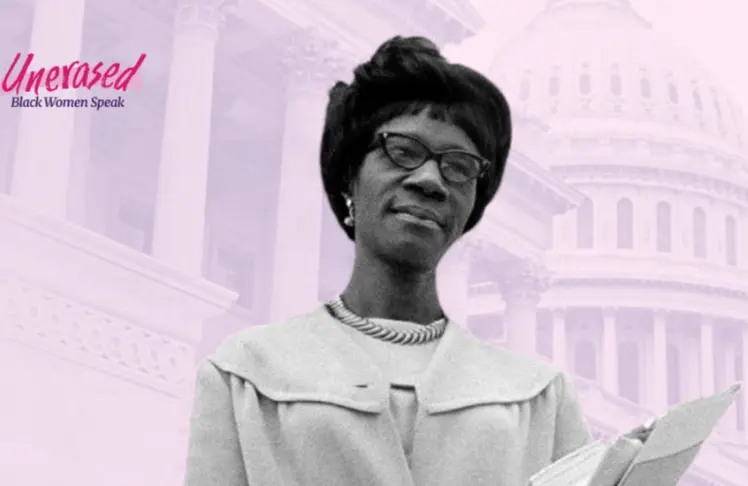
by Aprill O. Turner
Shirley Anita Chisholm
November 30, 1924 – January 1, 2005
The life of the great Shirley Chisholm was punctuated with pivotal firsts: She was the first Black woman elected to the U.S. Congress in 1968, the first Black candidate to seek a major party nomination for president in 1972, and the first Black woman to stare down the political system and declare her status: Unbought and Unbossed.
In a style that defiantly recast the mold for Black women in politics that has stuck over the decades, she famously proclaimed: “If they don’t give you a seat at the table, bring a folding chair.”
This November as we mark Chisholm’s 100th birthday, we also celebrate her living legacy. Daughter of immigrants, she aspired to transform her community and the nation, crowned the quintessential leader inspiring a generation of women to think and act boldly.
As the first Black woman to serve in Congress, Chisholm planted a seed of political activism that transcended race in America. Her legacy inspired leaders like Congresswoman Barbara Lee, a Democrat from California, to run for office. She also locked arms with white feminists who were part of the exploding women’s liberation movement of the 1960s and 1970s.
Chisholm boldly changed the face of leadership by challenging the status quo. She once said, “I am, was, and always will be a catalyst for change.” She enormously impacted women’s leadership, particularly Black women, and how they perceived political power and leadership.
Elected representation was essential for Chisholm’s lasting legacy. She knocked down barriers and opened doors that led to many other firsts witnessed in recent years, including the first Black woman U.S. Senator, Carol Moseley Braun; the first Black woman Vice President, Kamala Harris; and Supreme Court Justice, Ketanji Brown Jackson.
Higher Heights for America, the political home for Black women, lives the legacy of Shirley Chisholm in their daily lives. Their most recent research indicates that Congresswoman Chisholm’s one seat in Congress in 1978 has grown to 31 seats.
A Voice for Women’s Equality and Civil Rights
Congresswoman Chisholm provided a comprehensive voice for women’s equality and civil rights. She tirelessly championed many of the same issues that the nation is still grappling with, from the inequities in public education and civil rights to an all-out assault on women’s reproductive rights.
In 1968, she became the National Association for the Repeal of Abortion Laws’ (NARAL) first honorary president, joining her white counterparts by providing a Black woman’s perspective. She believed that her leadership on abortion rights would grant access to the full range of family planning services, regardless of race or socioeconomic status.
In a month dedicated to women’s history, Congresswoman Chisholm’s story is featured in a new Netflix film “Shirley“, which premiered March 22. She is portrayed by Academy Award–winning actor and director Regina King who has worked to bring Congresswoman Chisholm’s story to the screen for nearly 15 years.
King said they decided to release the film in this presidential election year to maximize the “impactful” release of an iconic political figure.
“As a team, we felt that is probably the best way we could possibly honor Shirley: to release her in a space that she created for herself,” King offered in a recent interview. “She was always going to fight the establishment, and that’s what she did until the very, very end. She embraced what made her different and used it as her superpower. .Making the decision to run for president as a Black woman in those times, it really made people think, ‘Is she crazy?’ But if you want to call it crazy, then crazy is a good thing.”
Congresswoman Chisholm believed that the key to an effective democracy rested in an engaged citizenry and that women had a pivotal role. She said, “Our country needs women’s idealism and determination, perhaps more in politics than anywhere else.”
Successive generations of Black women since Shirley Chisholm have taken up the charge, refusing to wait for an invitation to claim a seat at the table. They bring their chairs, bodies, and insistent voices into the room. In the spirit of Chisholm, that space at the table is not a place of privilege but where all citizens can be seen and heard.
Aprill O. Turner is constituency engagement advisor for Unerased Black Women Speak and Vice President of Communications with Higher Heights for America















